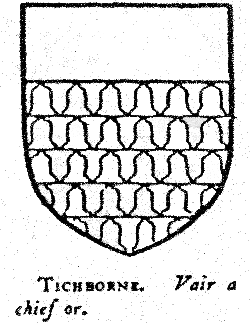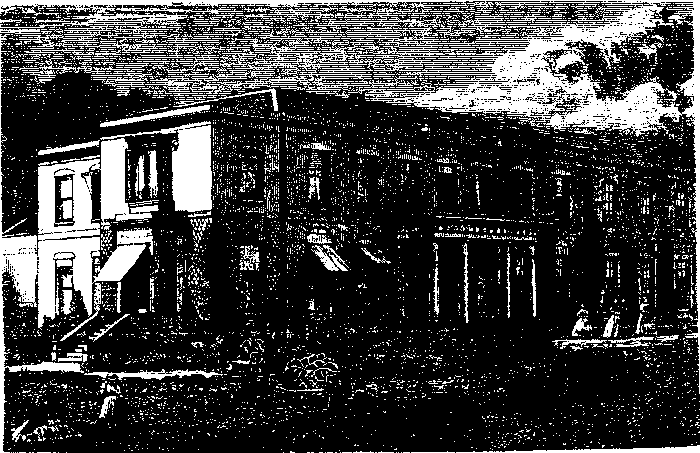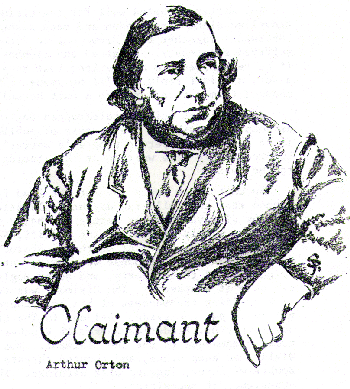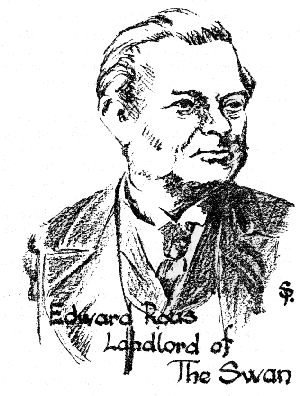THE TICHBORNE CLAIMANT:
RACE HORSE OR CART HORSE ?
By
Lesley Drew
 The nineteenth century trial of the Tichborne
Claimant was the longest and most expensive
court case in legal history. It captured
a world wide audience, cost the Tichborne
family £100,000 to defend their possessions,
and left a question mark in the minds of
many, just as Anastasia was to do in Russia
in the next century.
The nineteenth century trial of the Tichborne
Claimant was the longest and most expensive
court case in legal history. It captured
a world wide audience, cost the Tichborne
family £100,000 to defend their possessions,
and left a question mark in the minds of
many, just as Anastasia was to do in Russia
in the next century.
The Tichborne Trial was well documented
at the time, and has been the subject of
a number of publications since. There would
therefore appear to be little more to be
said on the subject, except perhaps to
consider how the people of Alresford viewed
the happenings which were to cause a little
Hampshire village to be the focus of international
attention. What was the reaction of the
local people to the Claimant, who came
to live among them in Alresford, Tichborne's
nearest town?
It was in the gathering dusk of a winter's afternoon just after Christmas 1866, that a big jowled, heavily built stranger walked into The Swan Hotel, Alresford. He was carrying a suitcase marked RCT and told the Landlord, Edward Rous, that he had just arrived on the train from London, wanted supper, and a bed for a few nights. He also requested that a pony and trap be ordered for him the following day, so that he could drive around the district. He signed the register, R.C. Taylor, and Rous had him shown to his room.
But Rous had read the London papers. He knew that a claimant to the Tichborne Estates had arrived in England from Australia. His description matched that of the man who had just walked into The Swan. Alresford had been expecting a visit, and this appeared to be the man, not Richard Taylor, but Roger Tichborne. It was the slack time between Christmas and New Year, and the hotel had no one else in for supper that evening. With his customer comfortably settled in the dining room, Rous took the bull by the horns and announced 'I shall drive you around myself tomorrow - near Tichborne'. Without realising it, at that moment, Rous had cast his vote in favour of the claimant. From then on, The Swan Hotel became the Claimant's head quarters, and Rous his firm supporter.
It was in 1854 that the heir to the Tichborne Estates, who had travelled to South America, was reported as having boarded a ship for Australia. This ship sank with all hands. However his widowed mother, Lady Tichborne, did not believe this to be true. She herself was not living at Tichborne, having leased it to a Colonel of the Scots Fusiliers, whilst she divided her time between London and Paris. Nine years after the sinking of the ship, Lady Tichborne decided to place an advertisement in international newspapers, asking for news of her lost son. Although no picture accompanied the advertisement, a likeness made of Roger Charles Tichborne in South America in 1853, showed him to be a handsome young man, and by the accounts of his old school friends, a very pleasant companion who was conscious of his duties as heir to the lands of an ancient Catholic family. As no responses were received, Lady Tichborne decided after a gap of two years, to place an advertisement in the Australian papers.

Tichborne House, Alresford c1850 — Courtesy
Hampshire Record Office
 The man who signed the visitors book at
The Swan Hotel, Alresford, in the name
of R. Taylor, had no such sense of duty,
least of all to his family of Orton. Christened
Arthur, he was the son of a prosperous
butcher in Wapping. One of twelve children,
he was sent to sea at 14 years of age.
He disliked the life of a cabin boy, and
when his ship reached Chile, he deserted,
and made his way to the town of Melipilla
where an English couple, the Hayleys, befriended
him. It is known that Roger Tichborne had
also been in this place, though at a different
time. After eighteen months, Arthur Orton
returned to Wapping, and when the chance
of a job, delivering ponies to Tasmania
came his way, he jumped at it. A young
man of enterprise, he travelled on to Australia
where he acquired a variety of work. However,
he developed a habit of walking out on
jobs and letting people down. He would
then turn up in another area, with a different
name, and take another job. He was working
as a butcher in Wagga Wagga, under the
name of Castro, when he saw a newspaper
containing an article about the Tichborne
family, and Lady Tichborne's advertisement
for information about her son Roger., Castro
promptly announced himself to a local solicitor,
as being Roger Tichborne. He was advised
to write immediately to Lady Tichborne,
identifying himself, and explaining his
financial position, which hopefully would
result in her sending money for his passage
back to England and his inheritance.
The man who signed the visitors book at
The Swan Hotel, Alresford, in the name
of R. Taylor, had no such sense of duty,
least of all to his family of Orton. Christened
Arthur, he was the son of a prosperous
butcher in Wapping. One of twelve children,
he was sent to sea at 14 years of age.
He disliked the life of a cabin boy, and
when his ship reached Chile, he deserted,
and made his way to the town of Melipilla
where an English couple, the Hayleys, befriended
him. It is known that Roger Tichborne had
also been in this place, though at a different
time. After eighteen months, Arthur Orton
returned to Wapping, and when the chance
of a job, delivering ponies to Tasmania
came his way, he jumped at it. A young
man of enterprise, he travelled on to Australia
where he acquired a variety of work. However,
he developed a habit of walking out on
jobs and letting people down. He would
then turn up in another area, with a different
name, and take another job. He was working
as a butcher in Wagga Wagga, under the
name of Castro, when he saw a newspaper
containing an article about the Tichborne
family, and Lady Tichborne's advertisement
for information about her son Roger., Castro
promptly announced himself to a local solicitor,
as being Roger Tichborne. He was advised
to write immediately to Lady Tichborne,
identifying himself, and explaining his
financial position, which hopefully would
result in her sending money for his passage
back to England and his inheritance.
The letter was written in January 1866 and as all mail travelled by sailing ship, there was no hope of a reply before May. Until then, he had to use his own wits to raise financial support to get him and his family to England. He had married an Australian girl who had an illegitimate daughter and was expecting their child. Australians were very much a gambling race, and many felt a wager on a baronet was as good a bet as one on a gold mine, which was just as well, for when Lady Tichborne's reply arrived, it was accompanied only by forty pounds. It also contained the startling information that her son was a devout Roman Catholic. Arthur Orton quickly arranged a second marriage to his wife, this one by a Catholic priest, which changed her name from Castro to Tichborne. The letter also informed him that Edward Doughty's Jamaican valet, Andrew Bogle, was now living in Sydney. Edward, born Tichborne, had changed his name to Doughty, and his valet Bogle had stayed often at Tichborne House, sleeping in the next room to Roger, and becoming the lonely boy's companion whilst there. By arrange ment, Arthur Orton met Bogle, who soon recognised him as Roger Tichborne.
It is to be wondered how such a recognition could be made, but it must be remembered that fifteen years had passed. The boy had grown to a man, and as a result of having carefully studied the newspaper article about the Tichbornes, Orton could talk confidently on general matters known to them both. Bogle agreed to travel with the Claimant's family to England, and they sailed before Lady Tichborne's further letter containing the passage money arrived. However, Orton by now had little need of it. The Australians had definitely decided he was a good bet, and a total of £20,000 had been received. The long sea journey was an ideal opportunity for Orton to chat with Bogle and learn the background of the life of the man he was claiming to be. Little wonder that by the time he reached Alresford, he had perfected his role as Roger Tichborne. The townspeople not only accepted him, but very much wanted him to be the rightful heir. Living in the latter part of the twentieth century, it is difficult to understand what a small, tight community Alresford was in the 1800's. Its people had little interest in anything that went on in the world beyond Winchester, some eight miles away. A very important element of that community was the Tichborne family. As large landowners, they had a great deal of residential property in the town, and were major employers. They patronised the cafes and traders of Alresford, a patronage that had been enjoyed in the area from Norman times. Roger's young brother, Alfred, had died in 1865, leaving the family entirely female, as prophesised by Lady Mabella Tichborne on her death bed in the 13th century but that is another story. The remaining relatives had left the neighbourhood, and Alresford desperately wanted a Tichborne back. Roger would suit them all well, and they prayed God he was authentic.
So, matters started well for the Claimant in Alresford. He had travelled alone from London and been acknowledged by the landlord of The Swan. Together they drove out to Tichborne, where he immediately suffered a set-back. He asked the Tichborne blacksmith, Etheridge, if he recognised him as the long lost Roger Tichborne, and received a very straight reply. "I'll be damned if you are, unless you have changed from a race horse to a cart horse!"
The Claimant quickly telegraphed Bogle to join him in Alresford as soon as possible. The success of publicity in a small community, is to quietly whisper to people 'a secret'. When Bogle arrived, three hundred people were waiting at the station to escort him triumphantly to The Swan.
So that Bogle could spy out the land for the Claimant, it was agreed that the following day he would attend Mass at Tichborne, and thereby discover how the matter was being reviewed in the village. Bogle was warmly greeted by the Bailiff, Noble, and by Mrs. Greenwood, the only remaining member of the Tichborne family in the neighbourhood. As the tenants of the House were away, she took Bogle on a sentimental inspection of the property, and asked Bogle to invite the Claimant to her home at Brockwood. The Claimant was not prepared to accept and risk spoiling the success of his acceptance in Alresford, but he could not avoid one unpleasant incident in The Swan. The Tichborne family solicitor, Mr. Frederick Bowker cif Winchester, arrived one evening and noisily demanded to see the Claimant. The two men took an immediate dislike to each other, and shouted threats and accusations until Bowker withdrew, issuing dire warnings. This was Orton's first experience of opposition.
The Claimant returned to his family in London, and engaged a solicitor, Mr. Holmes. Together they travelled to Paris where the Dowager lady Tichborne immediately acknowledged him as being her son Roger. The extraordinary instant recognition was made in the presence of Mr. Holmes, who immediately reported it to the London Times in order that the whole world should know.
The Dowager Lady Tichborne was a French lady of noble connections who hated England, its people and their customs. Included in that hate was the family into which she had unhappily married. Was perhaps this Claimant a weapon for her to use to beat the unfortunate Tichborne family? By now they had a male heir, for her son had been born post¬humously to Alfred, Roger Tichborne's younger brother, and the infant was living with his mother near Reading. The birth of the child however meant little to Alresford, for they had a fully grown Roger Tichborne, the Claimant. It had said so in 'The Times'.
When the Claimant returned to Alresford, accompanied by Mr.Holmes, he found The Swan decorated for a hero's welcome, and the church bells rang out. Recognition abounded : Stubbs the butcher, Huggins the chemist, and a retired solicitor, Hopkins, who invited him to stay a few days with him at The Lawns in Broad Street, and enjoy the local fishing when the season opened. This invitation led the Claimant to Mr. Lamb's shop, to purchase dry flies. The shopkeeper was requested for the same flies as Sir Roger had chosen sixteen years earlier, although locally the fashion had changed.
 The Claimant proved himself a good fisherman,
accomplished horse¬man and a good shot
with the gun, which impressed the gentry. "The
fellow must be a gentleman to fish and
shoot like that". Mr.Guildford Onslow,
M.P.,William Whitear Bulpett the banker,
James White Scott and Colonel Lushington,
all agreed the Claimant was Sir Roger,
and were prepared to put money behind his
claim. Sir Roger had been a Subal¬tern
in the Dragoon Guards (the Carabineers)
in Ireland, and learning that a number
were assembled in Camberley, the Claimant
travelled to that town. Sir Roger's batman,
his Sergeant Major and others, all signed
affidavits that the Claimant was indeed
Sir Roger. This was to be the high point
in the Claimant's suit. But of course,
there was opposition - the family, on whom
the Claimant made no impression at all.
The Claimant proved himself a good fisherman,
accomplished horse¬man and a good shot
with the gun, which impressed the gentry. "The
fellow must be a gentleman to fish and
shoot like that". Mr.Guildford Onslow,
M.P.,William Whitear Bulpett the banker,
James White Scott and Colonel Lushington,
all agreed the Claimant was Sir Roger,
and were prepared to put money behind his
claim. Sir Roger had been a Subal¬tern
in the Dragoon Guards (the Carabineers)
in Ireland, and learning that a number
were assembled in Camberley, the Claimant
travelled to that town. Sir Roger's batman,
his Sergeant Major and others, all signed
affidavits that the Claimant was indeed
Sir Roger. This was to be the high point
in the Claimant's suit. But of course,
there was opposition - the family, on whom
the Claimant made no impression at all.
Although the family were not living in either Tichborne or Alresford, they were not so far away as to be unable to pop over to the town, and sit in the bay window of the "Horse and Groom" (name changed from "Horse and Jockey" in 1850) in Broad Street, until they saw the Claimant.
They would spring a relative or close acquaintance of Sir Roger on to the Claimant, with the words "Hullo, do you remember me?" Though he made some brave efforts, the Claimant never did. One is led to speculate as to whether the family's sole purpose in these confrontations was to protect the interests of the infant son of Alfred Tichborne. It is likely also they were hoping to frighten away the Claimant, and be saved the enormous expense of litigation. The Claimant was not to be scared away. Alresford was keeping him well, and he was becoming enormously fat, so much so that Alresfordians proudly called him "the fat boy of England". When he arrived in England he weighed 16 stone. By 1868 he had risen to 21 stone and this was to increase to just under 28 stone by 1871.
However 1868 brought about the Claimant's greatest crisis to date. The Dowager Lady Tichborne died in London. Now there was to be no mother to recognise her son, no mother to melt the jury's heart. Then Hopkins, the supportive Alresford solicitor died. Equally disastrous, Rous, the landlord of The Swan, who had in the beginning been the strongest of supporters, following a quarrel over a pony and trap, deserted to the other side, a decision which made him so unpopular among the locals, that he had to leave town. The people had raised a very large sum of money for the Claimant, and were able to fund him £1400. A house was rented in Broad Street for him and his family, but then in 1869 he was declared bankrupt. This gave rise to the 'Tichborne Bonds' They consisted of a 'Promise' from the Claimant, to pay the holder £100 within a month of his regaining possession of the Tichborne Estates, and £40,000 was obtained this way. He was now a national figure, and members of the public who had never seen him, had an interest in his success. The whole matter was getting out of Alresford hands.
The Civil Trial commenced at Westminster
in 1870, and was a rare show. Even the
Prince and Princess of Wales came to watch
the cross examination. The case dragged
on, and it was two years before the Claimant
was committed to Newgate Gaol. There he
stayed from the 7th March to 26th April
1872, when he was released on bail, and
promptly returned to Alresford.
This time he stayed with Guildford Onslow,
and on the 14th May a local demonstration
in favour of the Claimant was staged. He
was driven around the area from Ropley
to Bishops Sutton, Cheriton, and to Tichborne
where the bands of Alresford and Cheriton
awaited to lead him into Alresford. Tichborne
tenants unhitched his horses and dragged
his wagonette-up the hill to The Swan,
where the new landlord, Humphrey Davies
greeted him. All Alresford was decorated
with bunting, hundreds gathered to hear
speeches. They were not disappointed. The
Claimant spoke strongly, and they loved
him. Inside The Swan, he received a deputation
from Southampton, and enlisted their support,
and that night he dined with all the local
notables. There was a firework display,
and the bands continued to play in the
streets until midnight.
The Criminal Trial lasted from April 1873 until February 1874, when he was sentenced to prison for fourteen years. He was a model prisoner, and was released after ten years, but although he continued to press his claim, there is no record that he ever came to Alresford again. He died in poverty in 1898 and was buried in an unmarked grave in a London cemetery. British justice had found that the Claimant was not Roger Tichborne. During the case however witnesses from Wapping had been called who denied that he was Arthur Orton, and although he was declared to be that man, the real truth is likely to remain one of the great Victorian mysteries. But this record is not that of the Tichborne Trial. It is about the response of the townsfolk of Alresford, to a man who to them will always be 'The Claimant'.
Copyright Lesley Drew October 1990
(Inspired by a lecture given by the late
Lt.Col. Digby Grist, O.B.E.)
Sources : Douglas Woodruff - The Tichborne
Claimant
Michael Gilbert - The Claimant
Atlay - Famous Case of the Century.